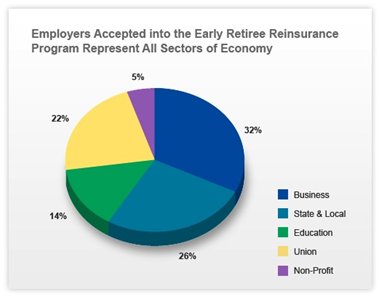The Affordable Care Act's Early Retiree Reinsurance Program
Rising health care costs have made it difficult for employers and unions to provide quality, affordable health coverage for workers and retirees while also remaining competitive in the global marketplace. The percentage of large firms providing workers with retiree health coverage dropped from 66 percent in 1988 to 29 percent in 2009.1. Many Americans who retire before they are eligible for Medicare without employer-sponsored health coverage see their life savings disappear because of medical bills and exorbitant rates in the individual health insurance market. Health insurance premiums for older Americans are over four times more expensive than those for young adults,2, and the deductible these enrollees pay is, on average, almost four times that in a typical employer-sponsored insurance plan.3
The Affordable Care Act creates a new program called the Early Retiree Reinsurance Program to help address this challenge that employers and older employees are facing. The Early Retiree Reinsurance Program (ERRP) provides much-needed financial relief to businesses, schools and other educational institutions, unions, State and local governments, and non-profits, in order to help retirees and their families continue to have quality, affordable health coverage.
Applicants who are approved to participate in the program receive reinsurance for the claims of high-cost retirees and their families. Approved applicants can use these funds to provide premium relief and other health care cost relief to their retirees and workers and their families, to offset increases in their own health care premiums or costs, or for a combination of these purposes.
Strong Nationwide Interest in the Program
There has been a tremendous amount of interest from businesses and organizations from across the country since the Early Retiree Reinsurance Program was announced just a few months ago in April. The Department of Health and Human Services has received applications from more than 50 percent of Fortune 500 companies, all major unions, and government entities in all 50 States and the District of Columbia.
In the first few months of the program, nearly 3,000 applications were approved representing a wide range of organizations that are interested in support from the Affordable Care Act to provide health care coverage to their early retirees. Applications have been approved in every State and the District of Columbia, and more applications are being reviewed every day. Starting in October, they will begin to submit claims and receive reinsurance payments on those claims.
Blank left for the map
The approved applications represent nearly every sector of the economy: 32 percent of applications came from businesses, 26 percent from State and local governments, 22 percent from union sponsors, 14 percent from schools and other educational institutions, and 5 percent from non-profits.

More information for employers who are interested in taking part in the Early Retiree Reinsurance Program or who have questions about the status of their application can be found at www.ERRP.gov or by calling the ERRP help line at 877-574-3777 (877-574-ERRP)
Relief for Businesses and Early Retirees
Employers with self-funded and insured plans can apply, including private companies, State and local governments, non-profits, religious organizations, as well as unions operating employee benefit plans.
Employers and unions that are accepted into the program will receive reinsurance payments for health benefit claims for retirees age 55 and older who are not yet eligible for Medicare, and their eligible spouses, including surviving spouses, and dependents. The amount of the reimbursement to the employer or union is 80 percent of medical claims costs for the health benefits of an individual between $15,000 and $90,000.
Health benefits claims that qualify for reinsurance payments are those for services covered by Medicare and include medical (including mental health), surgical, hospital, and prescription drug benefits. This program will not support benefits beyond those that seniors receive in Medicare.
This year, claims dating back to June 1, 2010 can be submitted beginning September, but starting 2011 claims can be submitted beginning the start of the
plan year. For plan years that start before and end after June 1, 2010, medical claims incurred between the start of the plan year (often January 1) and June 1 are credited toward the $15,000 threshold for reimbursement. However, only health benefit claims expenses incurred after June 1, 2010, are eligible for reimbursement under this program.
To participate in the program, health plan sponsors must have in place programs and procedures that generate or have the potential to generate cost savings for participants with chronic and high-cost conditions. And employers and unions participating in the program will be subject to audits of their health benefit plans to ensure fiscal integrity.
Bridge to 2014
The Early Retiree Reinsurance Program provides temporary assistance to employers and unions to help make health care coverage more available for Americans.
The program ends on January 1, 2014, when early retirees and their families, along with others, will be able to choose from a range of coverage options that will be available in new competitive private health insurance Exchanges.
1 Kaiser / HRET. Employer Health Benefits: 2009 Survey.
2 Center for Policy and Research. Individual Health Insurance 2009.
3 Kaiser Family Foundation. 2010. Survey of People Who Purchase Their Own Insurance.
Posted: October 4, 2010